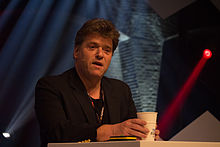
A blog is an informational website consisting of discrete, often informal diary-style text entries (posts). Posts are typically displayed in reverse chronological order so that the most recent post appears first, at the top of the web page. Until 2009, blogs were often the work of a single individual, occasionally of a small group, and often covered a single subject or topic. In the 2010s, "multi-author blogs" (MABs) emerged, featuring the writing of multiple authors and sometimes professionally edited. MABs from newspapers, other media outlets, universities, think tanks, advocacy groups, and similar institutions account for an increasing quantity of blog traffic. The rise of Twitter and other "microblogging" systems helps integrate MABs and single-author blogs into the news media. Blog can also be used as a verb, meaning to maintain or add content to a blog.

Internet culture is a quasi-underground culture developed and maintained among frequent and active users of the Internet who primarily communicate with one another online as members of online communities; that is, a culture whose influence is "mediated by computer screens" and information communication technology, specifically the Internet.
A dark net or darknet is an overlay network within the Internet that can only be accessed with specific software, configurations, or authorization, and often uses a unique customized communication protocol. Two typical darknet types are social networks, and anonymity proxy networks such as Tor via an anonymized series of connections.
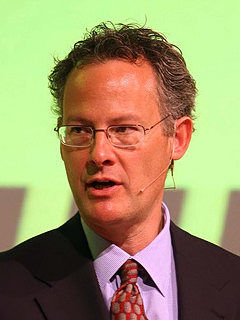
Nicholas G. Carr is an American journalist and writer who has published books and articles on technology, business, and culture. His book The Shallows: What the Internet Is Doing to Our Brains was a finalist for the 2011 Pulitzer Prize in General Nonfiction.

Judith Stefania Donath is a fellow at Harvard's Berkman Center, and the founder of the Sociable Media Group at the MIT Media Lab. She has written papers on various aspects of the Internet and its social impact, such as Internet society and community, interfaces, virtual identity issues, and other forms of collaboration that have become manifest with the advent of connected computing.
Amateur professionalism or professional amateurism is a blurring of the distinction between professional and amateur within any endeavour or attainable skill that could be labelled professional in fields such as writing, computer programming, music or film. The idea was used by Demos, a British think tank, in the 2004 book The Pro-Am Revolution co-authored by writer Charles Leadbeater. Leadbeater has evangelized the idea by presenting it at TEDGlobal 2005. The idea is distinct from the sports term "pro–am" (professional–amateur), though derived from it.
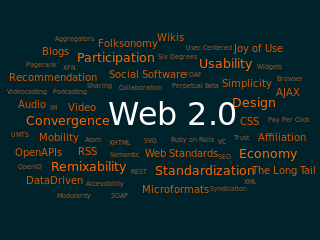
Web 2.0 refers to websites that emphasize user-generated content, ease of use, participatory culture and interoperability for end users.
Internet identity (IID), also online identity, online personality, online persona or internet persona, is a social identity that an Internet user establishes in online communities and websites. It may also be an actively constructed presentation of oneself. Although some people choose to use their real names online, some Internet users prefer to be anonymous, identifying themselves by means of pseudonyms, which reveal varying amounts of personally identifiable information. An online identity may even be determined by a user's relationship to a certain social group they are a part of online. Some can be deceptive about their identity.

Clay Shirky is an American writer, consultant and teacher on the social and economic effects of Internet technologies and journalism.

The free-culture movement is a social movement that promotes the freedom to distribute and modify the creative works of others in the form of free content or open content without compensation to, or the consent of, the work's original creators, by using the Internet and other forms of media.
Peer production is a way of producing goods and services that relies on self-organizing communities of individuals. In such communities, the labor of many people is coordinated towards a shared outcome.

Wikinomics: How Mass Collaboration Changes Everything is a book by Don Tapscott and Anthony D. Williams, first published in December 2006. It explores how some companies in the early 21st century have used mass collaboration and open-source technology, such as wikis, to be successful.

The Cult of the Amateur: How Today's Internet Is Killing Our Culture is a 2007 book written by entrepreneur and Internet critic Andrew Keen. Published by Currency, Keen's first book is a critique of the enthusiasm surrounding user-generated content, peer production, and other Web 2.0–related phenomena.
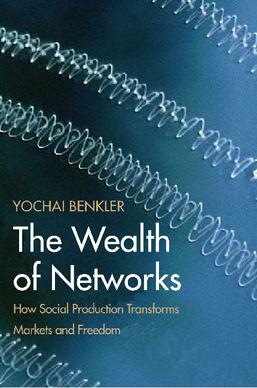
The Wealth of Networks: How Social Production Transforms Markets and Freedom is a book by Harvard Law School professor Yochai Benkler published by Yale University Press on April 3, 2006. The book has been recognized as one of the most influential works of its time concerning the rise and impact of the Internet on the society, particularly in the sphere of economics. It also helped popularize the term Benkler coined few years earlier, the commons-based peer production (CBPP).
The Scene Aesthetic was an American alternative rock band based in Seattle, Washington. The duo consists of Andrew de Torres and Eric Kimberlin.
Amateur pornography is a category of pornography that features models, actors or non-professionals performing without pay, or actors for whom this material is not their only paid modeling work. Reality pornography is professionally made pornography that seeks to emulate the style of amateur pornography. Amateur pornography has been called one of the most profitable and long-lasting genres of pornography.

Is Google Making Us Stupid? What the Internet Is Doing to Our Brains! is a magazine article by technology writer Nicholas G. Carr, and is highly critical of the Internet's effect on cognition. It was published in the July/August 2008 edition of The Atlantic magazine as a six-page cover story. Carr's main argument is that the Internet might have detrimental effects on cognition that diminish the capacity for concentration and contemplation. Despite the title, the article is not specifically targeted at Google, but more at the cognitive impact of the Internet and World Wide Web. Carr expanded his argument in The Shallows: What the Internet Is Doing to Our Brains, a book published by W. W. Norton in June 2010.

Remix: Making Art and Commerce Thrive in the Hybrid Economy is Lawrence Lessig's fifth book. The book was made available for free download and remixing under the CC BY-NC Creative Commons license via Bloomsbury Academic. It is still available via the Internet Archive. It details a hypothesis about the societal effect of the Internet, and how this will affect production and consumption of popular culture to a "remix culture".
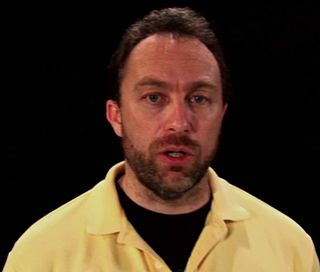
The Truth According to Wikipedia, also referred to as Wiki's Truth, is a Dutch documentary about Wikipedia directed by IJsbrand van Veelen. It was screened at The Next Web conference in Amsterdam on 4 April 2008 and broadcast by the Dutch documentary series Backlight on Nederland 2 on 7 April 2008. It was subsequently made available through American Public Television.
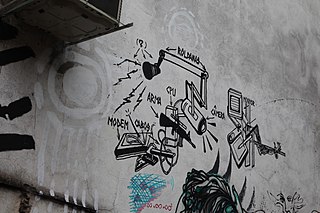
Digital dystopia, cyber dystopia or algorithmic dystopia refers to an alternate future or present in which digitized technologies or also algorithms have caused major societal disruption. It refers to narratives of technologies influencing social, economic, and political structures, and its diverse set of components includes virtual reality, artificial intelligence, ubiquitous connectivity, ubiquitous surveillance, and social networks. In popular culture, technological dystopias often are about or depict mass loss of privacy due to technological innovation and/or social control. They feature heightened socio-political issues like social fragmentation, intensified consumerism, dehumanization, and mass human migrations.


